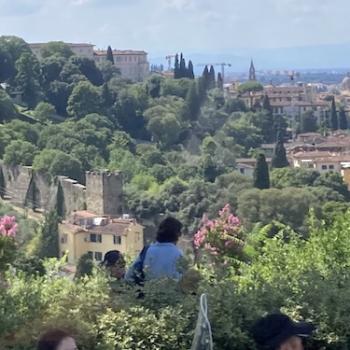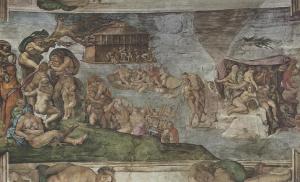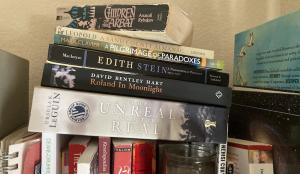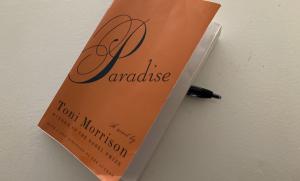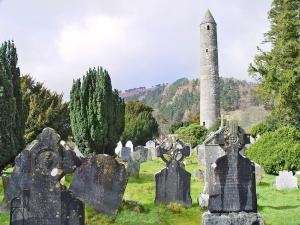
In Gregory of Nyssa’s treatise On the Soul and Resurrection, he tells of his journey to see his big sister Macrina after the death of their brother Basil. These are the three most important—for us, though certainly not for God—members of what I earlier called the first family of Nicene Christianity. The two siblings are grieving, and Gregory seeks his sister out for a theological conversation. His principle question will be one familiar to us all. “Where is Basil now?” Said otherwise: where do we go when we die? Her response may surprise you.
What the Soul Remembers
The body will decompose, she says. And there is no “place” for the soul, the life and energy and intellect and will that animated that body, to go. It belongs with the body. It “knows” and “remembers” every detail of the body, and the growth and changes and encounters they experienced together. For that reason, Macrina says, it will stay right there.
Basil’s soul will stay “near each [atom of his body] by its power of recognition, and will persistently cling to the familiar atoms, until their concourse after this division again takes place in the same way, for that fresh formation of the dissolved body which will properly be, and be called, resurrection.”
The familiarity of the body will keep the soul near, until they are reknit into a full, living, resurrected man.
I’d like to spend some time with the image of resurrection. I’d like especially to ponder it in light of what I’ve begun to work out in this blog about the afterlife. But that can be for another time.
Here I’d like to notice something about gender, bodies, and Christianity.
Macrina and the Woman of Her World
Women, in the ancient Mediterranean world, were generally associated with materiality. That’s why we still have the root mater, or mother, in our English word. A man’s ultimate world, for those privileged to pursue it, was reason. The intellect. The life of the mind. Philosophy and theology. Women were dedicated to “lower” things. Food, home economics, childbirth.
With the ancient Greek Christians, though, this began ever so slowly to change. We already see some of this in the New Testament. Women could be theologians and teachers. While Macrina left no writings, Gregory identifies her as the primary theology teacher in the family. In his story of her life, Gregory says that her theology was downright “manly.” And in the dialogue on Basil’s soul, she plays the role of Socrates, leading her pupil toward true wisdom.
Even the development of monastic communities for women was a radical innovation. Macrina–through Basil– was largely responsible for that idea. Woman were not just for giving birth and managing the home of a man’s world. They could remove themselves from marriage and family life and dedicate themselves to communities of women and to the contemplation of God. As if there were, in the eschaton, no longer male nor female! (Gregory developed some thoughts on this theme).
Gender-Bending in the Ancient Christian World
Once you notice this gender-bending in the Greek Fathers, you find it more and more. Macrina once scolded Basil for being full of himself after a particularly good response to his course on rhetoric. Macrina was telling her younger brother that the masculine life of the mind is not enough. Especially if it causes us to ignore the other bodies before us.
None of this is unproblematic. Feminist writers today offer careful readings of these texts, noticing when women are absent, but also when they are problematically present. Carla Sundberg notes that we don’t actually hear from Macrina here, we hear from Gregory’s fictionalized version of his sister.
And yet, as Sundberg also notes, something remarkably subversive happens. Something that tends to suggest that Macrina (among others) was really there, in the literary background, feminizing the theology of the early church.
Bodies and the Resurrected Life
Here the proof is in the surprise of the dialogue. Basil’s soul is not through with his body. Materiality matters. The soul has too many fond memories of meals enjoyed, journeys undertaken, and embraces given to let go.
For the ancient world this is, if you’ll excuse the harsh sound of the phrase, a remarkably womanish thing to say about the supposedly manly soul. Bodies matter. So much so that our souls refuse to be resurrected until they are reunited to their companions. All the child-birthing and rearing, the home management, meals, bodily concerns: they all belong, in the end.
For Macrina and for Gregory, this is simply a working out of Jesus’ bodily resurrection and Paul’s reflections on it. If the tomb was empty, and that Spirit is alive in us, then we can expect a resurrected life for our mortal bodies. It’s right there in the Epistle to the Romans. It just took a woman, apparently, to notice.


